An Angel from Texas

Brief Synopsis
Cast & Crew
Ray Enright
Eddie Albert
Rosemary Lane
Wayne Morris
Jane Wyman
Ronald Reagan
Film Details
Technical Specs

Synopsis
Peter "Tex" Coleman, a butter and egg man from Texas, comes to New York with his mother's life savings to buy a hotel in the big city and be near his stage struck sweetheart, Lydia Weston. Upon his arrival, Tex finds Lydia working as a secretary for a couple of fast-talking producers rather than being the stage star that her home town thinks she has become. Tex is just the angel for whom sharpshooter producers Mac McClure and Marty Allen have been waiting, because they have a play set for rehearsal but no money to produce it, and their leading lady, Valerie Blayne, is adding to their problems by threatening reprisals from her gangster boyfriend, Pooch Davis, unless the show opens on schedule. Tex agrees to invest his money in the show if Lydia is given the lead, and when Mac and Marty consent to his terms, the play goes into rehearsal as a drama with two leading ladies. When Valerie threatens Mac with bodily harm unless she plays the lead, Mac informs Tex that he is going to fire Lydia unless he buys the entire show. Sensing that the play would work as a farce, Marty's wife Marge puts up the money on the condition that Tex play the male lead. True to Marge's instincts, on opening night, the play has the audience rolling in the aisles as dynamite planted on stage by Valerie's vindictive boyfriend explodes, and the actors' performances are so bad that they are funny. As a comedy, the show becomes a smash success, but when a plagarism suit looms on the horizon, Tex and Marge sell the show back to its eager producers and leave them holding the bag.

Director
Ray Enright
Cast

Eddie Albert

Rosemary Lane

Wayne Morris
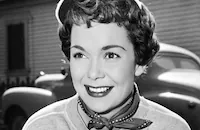
Jane Wyman
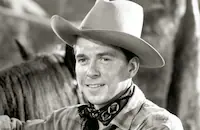
Ronald Reagan
Ruth Terry

John Litel
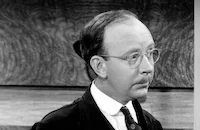
Hobart Cavanaugh
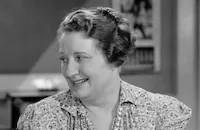
Ann Shoemaker
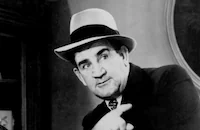
Tom Kennedy
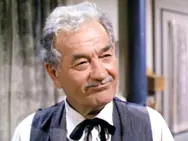
Milburn Stone
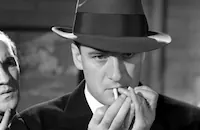
Elliott Sullivan
Paul Phillips

Emmett Vogan
Ferris Taylor

George Irving
Lottie Williams
Mira Mckinney
John Deering
Dudley Dickerson
Vera Lewis
Dorothy Vaughan
George Guhl
Jack Kennedy
Ed Gargan
Billy Wayne
Frank Mayo
Joe Levine
Johnnie Albright
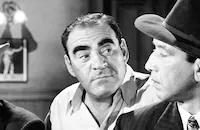
Ralph Dunn
Claude Wisberg
Michael Conroy
Richard Clayton
Al Stedman

Jack Mower
William Gould
Gus Glassmire

Holmes Herbert
Charles Costello
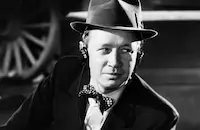
Eddie Acuff
Jimmy Fox
Crew
Milo Anderson
Hugh Cummings
Robert Fellows
Esdras Hartley
Jesse Hibbs
Clarence Kolster
Charles Lang
Bertram Millhauser
Fred Niblo Jr.
Arthur L. Todd
Jack L. Warner
Perc Westmore

Film Details
Technical Specs

Articles
An Angel From Texas
Whatever Warners paid for the rights to the early George S. Kaufman opus The Butter and Egg Man, it was a bargain for the sheer volume of use that the studio received. Beyond a direct adaptation in 1928, its premise--that of a cash-flush patsy inveigled into backing a stage production--was also recycled for The Tenderfoot (1932), Hello, Sweetheart (1935), Dance Charlie Dance (1937), and Three Sailors and a Girl (1953). Here, the naif is Peter Coleman (Albert), an amiable Texan who has backed the ambitions for Broadway stardom of his girlfriend Lydia (Rosemary Lane).
Unfortunately, the closest that Lydia has come to the footlights has been a secretarial job with the spurious producers Mac McClure (Morris) and Marty Allen (Reagan). The impresarios are desperate to salvage their latest project, and Allen's purse-string-controlling spouse Marge (Wyman) is no help. The minute Peter shows up in NYC with his family's $20,000 life savings, McClure and Allen immediately try to rid him of his foolish plans to invest the cash in a hotel. Peter, however, isn't as green as the producers had hoped; he makes his backing contingent on Lydia's being given the lead. Worse, this turn of events makes the previously cast diva Valerie Blayne (Ruth Terry) and her mob-connected admirers very unhappy.
Dependable house "B" director and onetime Sennett apprentice Ray Enright kept the farce moving at a good clip--he should have been familiar enough with the material, having helmed the aforementioned The Tenderfoot for frequent collaborator Joe E. Brown. Still, An Angel from Texas did middling business and not a great deal to advance either of the newlyweds' careers. In Jane Wyman: The Actress and the Woman (Dembner Books), biographer Lawrence J. Quirk quoted a mid-'60s conversation with veteran screen journalist Ruth Waterbury. "In the 1940 period the Warner people were patronizing them almost contemptuously and treating them as if they were a couple of young bubblehead pretty-types long on muscles [his] and curves [hers] but short on brains or real talent. What a surprise those two turned out to be later!"
The next feature Reagan and Wyman performed in together--Tugboat Annie Sails Again (1940)-- would prove to be the last. They'd be among the many Warner luminaries making cameos in the Doris Day vehicle It's a Great Feeling (1949), released the year of their divorce. Quirk offered an oddly prescient anecdote from actress Joy Hodges in his tome concerning the waning days of the marriage. "Jane said one prophetic thing to me...a short time before the announcement of their breakup. I said I was aware that she and Dutch did not seem too happy during their last trip to New York, and she replied, 'Well, if he is going to be President, he is going to get there without me.'"
Producer: Robert Fellows
Director: Ray Enright
Screenplay: Fred Niblo, Jr., Bertram Millhauser, based on the play "The Butter and Egg Man" by George S. Kaufman
Cinematography: Arthur L. Todd
Art Direction: Esdras Hartley
Music: Howard Jackson
Film Editing: Clarence Kolster
Cast: Eddie Albert (Peter Coleman), Rosemary Lane (Lydia Weston), Wayne Morris (Mac McClure), Jane Wyman (Marge Allen), Ronald Reagan (Marty Allen), John Litel (Gordon Quigley).
BW-69m. Closed Captioning.
by Jay S. Steinberg

An Angel From Texas
Eddie Albert (1906-2005)
The son of a real estate agent, Albert was born Edward Albert Heimberger in Rock Island, Ill., on April 22, 1906. His family relocated to Minneapolis when he was still an infant. Long entralled by theatre, he studied drama at the University of Minnesota. After years of developing his acting chops in touring companies, summer stock and a stint with a Mexican circus, he signed a contract with Warner Bros. and made his film debut in Brother Rat (1938). Although hardly a stellar early film career, he made some pleasant B-pictures, playing slap happy youths in Brother Rat and a Baby (1940), and The Wagons Roll at Night (1941).
His career was interrupted for military service for World War II, and after his stint (1942-45), he came back and developed a stronger, more mature screen image: Smash-Up: The Story of a Woman (1947); Carrie (1952); his Oscar® nominated turn as the Bohemian photographer friend of Gregory Peck in Roman Holiday (1953); a charming Ali Hakim in Oklahoma (1955); and to many critics, his finest hour as an actor, when he was cast unnervingly against type as a cowardly military officer whose lack of commitment to his troops results in their deaths in Attack! (1956).
As he settled into middle-age, Albert discovered belated fame when he made the move to Hooterville. For six seasons (1965-71), television viewers loved Eddie Albert as Oliver Wendal Douglas, the bemused city slicker who, along with his charming wife Lisa (Eva Gabor), takes a chance on buying a farm in the country and dealing with all the strange characters that come along their way. Of course, I'm talking about Green Acres. If he did nothing else, Alberts proved he could be a stalwart straight man in the most inane situations, and pull it off with grace.
After the run of Green Acres, Albert found two of his best roles in the late stages of his career that once again cast him against his genial, good-natured persona: the fiercly overprotective father of Cybill Shepherd in The Heartbreak Kid (1972), for which he earned his second Oscar® nomination; and the sadistic warden in Robert Aldrich's raucous gridiron comedy The Longest Yard (1974). Soon, Albert was in demand again, and he had another hit series, playing a retired police officer who partners with a retired con artist (Robert Wagner) to form a detective agency in Switch (1975-78).
The good roles slowed down slightly by the dawn of the '80s, both film: The Concorde: Airport '79 (1979), How to Beat the High Co$t of Living (1980), Take This Job and Shove It (1981); and television: Highway to Heaven, Murder, She Wrote, Thirtysomething, offered him little in the way of expansion. Yet, Albert spent his golden years in a most admirable fashion, he became something of activist for world health and pollution issues throughout the latter stages of his life. It is widely acknowledged that International Earth Day (April 22) is honored on his birthday for his tireless work on environemental matters. Albert was married to famed hispanic actress Margo (1945-85) until her death, and is survived by his son, actor Edward Albert, a daughter, and two granddaughters.
by Michael T. Toole
Eddie Albert (1906-2005)
Ronald Reagan, 1911-2004 - TCM Remembers Ronald Reagan
Ronald Reagan, the actor turned elected official whose fascinating career saw him develop as a contract player for Warner Brothers studios, to a politician who fulfilled his ambitions by becoming the 40th President of the United States, died at his home in Los Angeles on June 5 after a long battle with Alzheimer's disease. He was 93.
He was born Ronald Wilson Reagan on February 6, 1911 in Tampico, Illinois to John and Nelle Reagan. When Reagan was nine, his family settled down in the small community of Dixon, about 100 miles west of Chicago. After high school, Reagan enrolled in Eureka College, a small Christian school near Peoria. He graduated in 1932 with a degree in Economics, and pursued a career in broadcasting. His first gig was as a part-time announcer at WOC in Davenport, Iowa. Within a year, WOC had merged with its big-sister station, WHO in Des Moines, and Reagan was hired as a sports announcer.
In the spring of 1937, Reagan drove to Southern California to catch the Chicago Cubs in spring training on Santa Catalina Island. While he was in California, he wrangled a screen test and signed a contract for $200 a week with Warner Brothers. His film debut was rather inauspicious; he portrayed a radio announcer in an innocuous comedy Love is on the Air (1937). He made a few more "B" programmers like Hollywood Hotel (also 1937), and Girls on Probation (1938), before getting his first prominent role opposite Bette Davis in the popular tearjerker, Dark Victory (1939).
Although he seldom got credit for being a good actor, there was no denying that Reagan held his own given the right material: Knute Rockne, All American as the doomed Notre Dame football hero George "The Gipper" Gipp, where he delivered the film's immortal line "Win one for the Gipper!"; Santa Fe Trail in which he ably supports Errol Flynn in one of the boxoffice hits of its era (both 1940); Kings Row (1941), featuring one of his finest performances as a small-town playboy whose legs are amputated by a careless surgeon; and Desperate Journey (1942) where he again supported Flynn in an exciting action picture.
Due to his poor eyesight, Reagan didn't see any action in World War II, so the studio heads assigned him to star in a series of patriotic films produced by the First Motion Picture Unit of the Army Air Forces in Culver City. Between 1942-45, Reagan starred in over 400 of these films. After the war, Reagan still found some good roles: The Voice of the Turtle (1947) proved he had a deft hand at light comedy opposite Eleanor Parker; The Hasty Heart (1949) offered another underrated performance as he ably portrayed the Yank in John Patrick's much heralded wartime play; and Storm Warning (1950) was a slick melodrama that cast Reagan as a crusading District Attorney determined to bring the KKK in a small southern town, with the help of Doris Day and Ginger Rogers!
It was around this time that Reagan became involved in politics. In 1947, he began a five-year term as president of the Screen Actors Guild (SAG), and testified in October of that year before the newly formed House Un-American Activities Committee (HUAC). He identified suspected Communists Larry Parks, Howard Da Silva and Alexander Knox, all of whom were subsequently called to testify, and subsequently blacklisted. Later records showed Reagan was so concerned about the Communist influence in Hollywood, that he became an FBI informer.
As Reagan became steeped in his political career, his parts throughout the '50s became inferior: the notorious Bedtime for Bonzo (1951); the coy "sex" comedy She's Working Her Way Through College (1952) that cast him as a college professor who romances a stripper! (Virginia Mayo); Cattle Queen of Montana (1955), a sluggish Western that even the redoubtable Barbara Stanwyck couldn't save; and finally Hellcats of the Navy (1957), a stodgy war picture that would be his only film that co-starred his wife Nancy (Davis).
Television offered some salvation. For eight years, (1954-62), Reagan served as the host of General Electric Theater, a televised series of dramas. He also found a niche as GE's goodwill ambassador to employees and to civic and business groups around the country, furthering his taste and honing his craft as a public official. By the mid '60s, Reagan would move into politics entirely, save for one last film, the thrilling The Killers (1964), Reagan's only known villainous role, as a murderous gangster. That same year, he actively campaigned for Republican Presidential candidate Barry Goldwater, although Goldwater lost to Lyndon B. Johnson.
Reagan whose profile was riding high, had cemented his future as a successful politician. In 1966, he ran against incumbent Governor Pat Brown for the state of California and won, serving successfully for two terms until 1974.
Reagan began an all-out, two-year drive to wrest the 1976 nomination from incumbent Gerald R. Ford, an appointed vice president who became president on the resignation of Nixon. Reagan fell short by a handful of delegates to the Republican national convention. But Ford lost to Jimmy Carter, and Reagan became the front-runner to challenge Carter in 1980. After defeating Carter, Reagan held two terms as President of the United States (1981-89). After his second term was over, he retired quietly in California. In 1994, it was revealed to the media that Reagan was suffering from Alzheimer's disease; he had been kept out of the public eye since then.
He was married briefly to actress Jane Wyman (1940-48), and had two children; a daughter Maureen and an adopted son, Michael. In 1952, he married a budding film starlet, Nancy Davis, who bore him two more children; a daughter, Patty; and a son, Ronald Jr. Ronald Reagan is survived by Nancy, Michael, Patty and Ron Jr. His daughter Maureen died of Melanoma in 2001 at the age of 60.
by Michael T. Toole
Ronald Reagan, 1911-2004 - TCM Remembers Ronald Reagan
Quotes
Trivia
Notes
For information on other versions of George S. Kaufman's play, consult the entry for The Tenderfoot (see below).

Miscellaneous Notes
Released in United States 1940
Released in United States 1940














